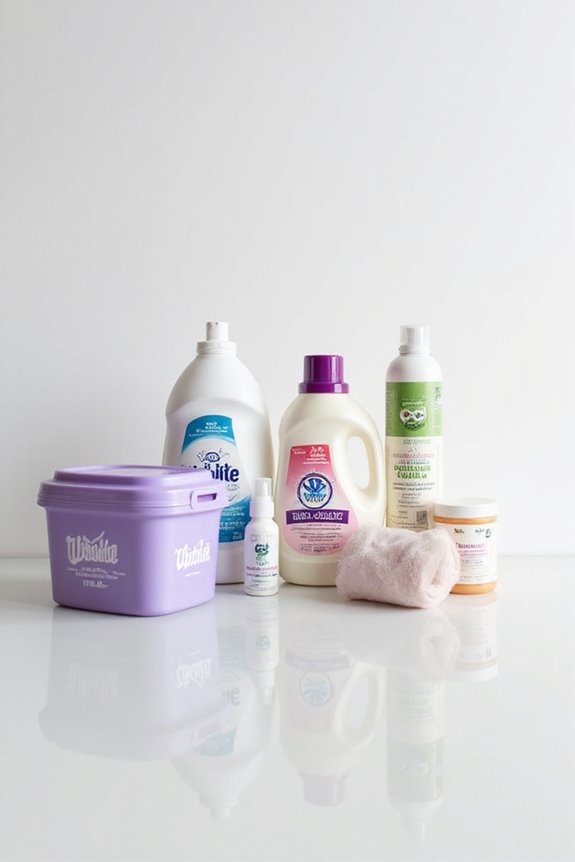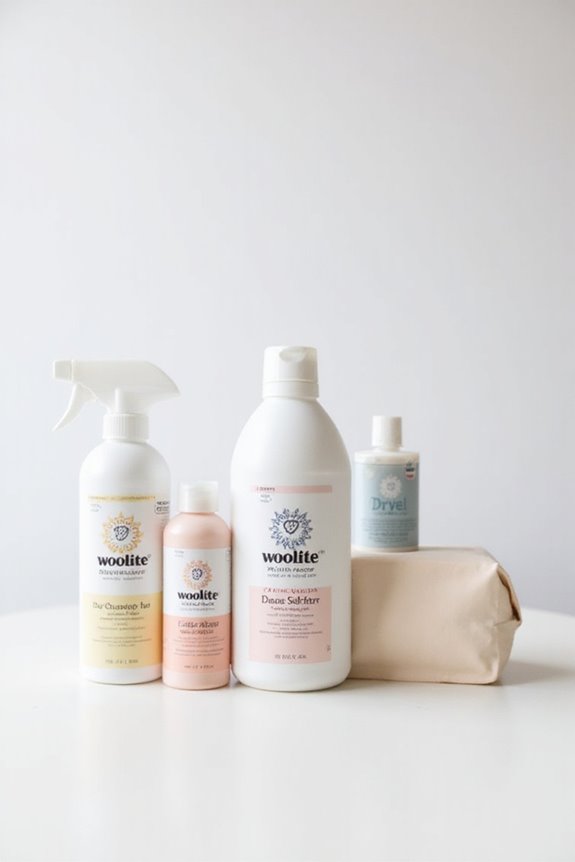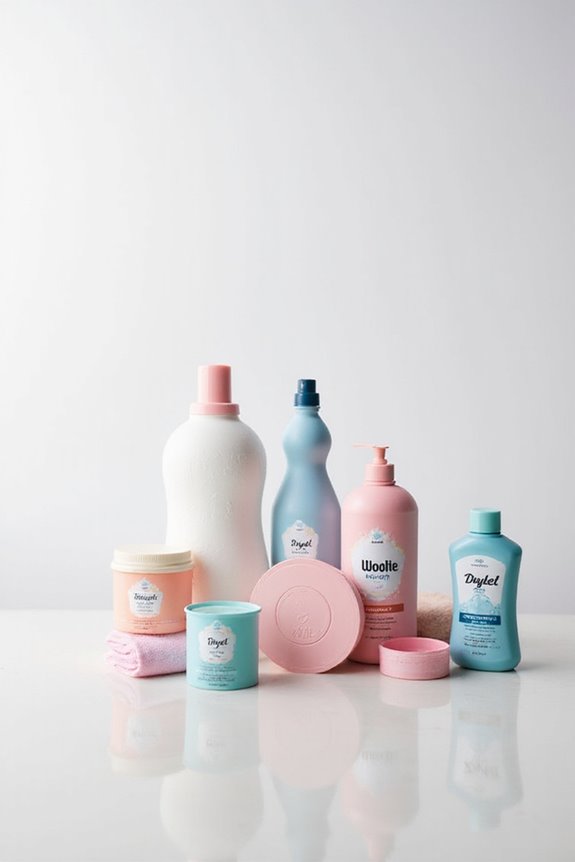When it comes to washing delicate fabrics, we recommend using the gentle wash cycle. This cycle features slow agitation and low spin speeds, making it perfect for our favorite silk and lace items. It’s like giving your clothes a spa day—no roughhousing allowed! We’ve found that using cool water keeps colors vibrant and prevents shrinking. Plus, don’t forget to use a pH-neutral detergent to keep everything soft. Stick around, and we’ll share more tips for keeping your delicates in great shape!
Key Takeaways
- The gentle cycle is ideal for delicates, featuring slow agitation and low spin speeds to minimize fabric stress.
- Cold water (around 80°F) is recommended to prevent shrinking and fading of delicate fabrics.
- The hand wash cycle offers the gentlest cleaning option, perfect for very delicate items.
- Using mesh garment bags during the wash adds an extra layer of protection against snagging.
- Always check care labels for specific washing instructions tailored to the fabric type.
Understanding Delicate Fabrics
When we talk about delicate fabrics, we’re diving into a world of softness and elegance. These materials, like silk and chiffon, are lighter and more flexible than sturdier options. They drape beautifully and feel great against our skin, but they need special care. Their fabric properties make them vulnerable to wear and tear, so understanding proper laundering techniques is key. We should wash them in cool water with gentle, pH-neutral detergents, avoiding harsh scrubbing. Soaking works wonders without damaging fibers. And remember, no wringing or twisting! It’s like giving our clothes a gentle hug. By treating these fabrics right, we can keep them looking stunning for years. Trust us, it’s worth the extra effort! Using hypoallergenic and pH-neutral detergents ensures that the delicate fibers remain intact and vibrant throughout the washing process.
Types of Gentle Wash Cycles
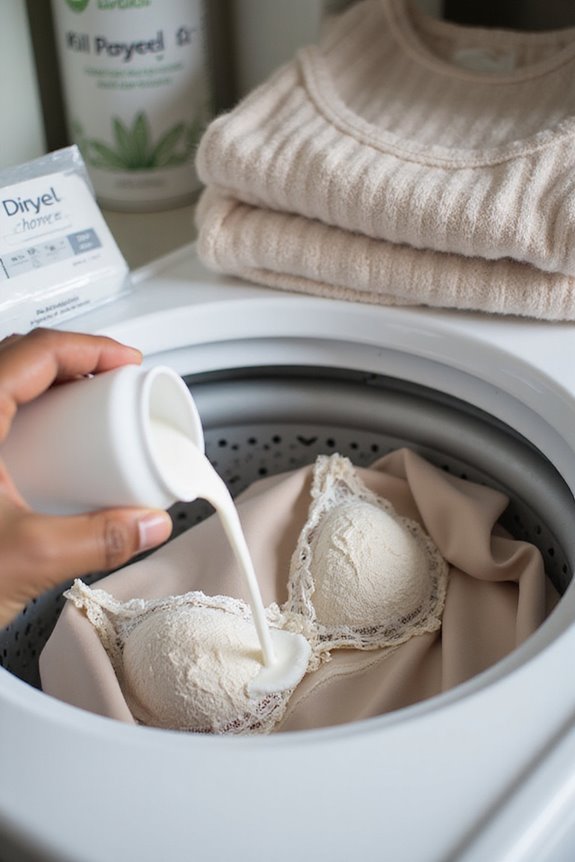
Finding the right wash cycle for delicate fabrics can feel like a puzzle, but it’s really about choosing the right options. We’ve got several gentle cycles to contemplate based on our wash preferences. The gentle cycle is perfect for silk and lace, using slow agitation and low spin speeds. If we want to prevent color fading, the cold wash cycle is a great choice. For those quick refreshes, the quick wash cycle saves time, though it’s not ideal for super delicate items. Finally, the rinse and spin cycle is perfect for clothes needing a quick rinse. Each gentle cycle has its strengths, making it easier for us to keep our delicates safe and clean!
Recommended Detergents for Delicates
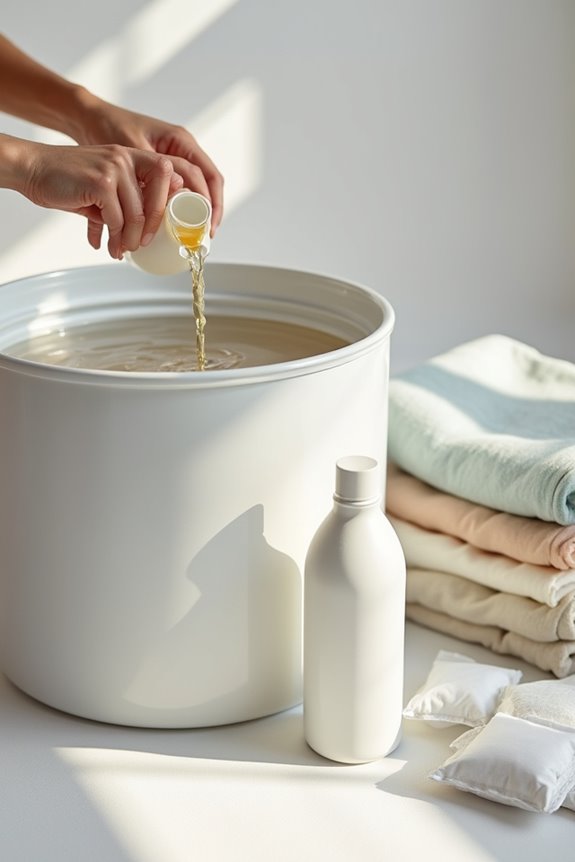
Choosing the right detergent for our delicates can make a big difference in how well they hold up over time. We should look for pH-balanced detergents that avoid harsh chemicals like sulfates and bleaches. For example, Dropps Laundry Detergent is a great choice, as its gentle formula protects our delicate fabrics.
If we’re washing silk or wool, enzyme-free options are best, like Dirty Labs Hand-Wash & Delicates detergent. It specializes in keeping those fibers intact.
Let’s not forget eco-friendly options, too! Many of these detergents are biodegradable and free from toxic ingredients, making them safe for our skin and the planet. Plus, they often come in recyclable packaging—talk about a win-win! Additionally, using gentle, pH-neutral detergents helps maintain the softness and longevity of delicate fabrics.
Water Temperature and Settings
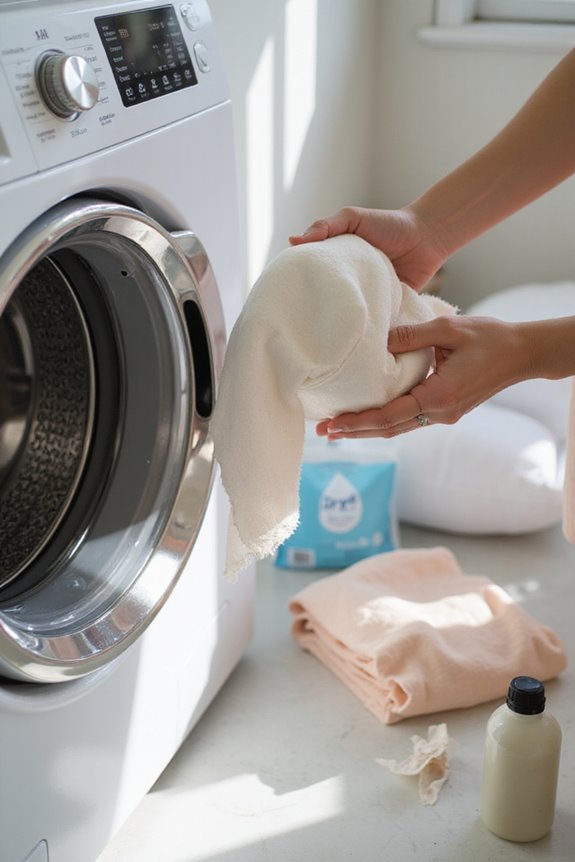
To keep our delicates looking great, we need to pay close attention to water temperature and washer settings. For most of our delicate fabrics, cold water—around 80°F—is the safest choice. It helps prevent shrinking and fading, which is essential for those precious items we love. The Delicate cycle usually pairs with this cold water, offering gentle washing action. If we’re feeling fancy, the Hand Wash cycle is another option, typically gentler. Just remember, if our machine defaults to warm water, we should manually override it. Using mesh garment bags can also protect those fragile fabrics. By prioritizing cold water and the right cycle settings, we’re not just caring for our clothes; we’re also being eco-friendly! Additionally, using a hypoallergenic formula can ensure that the detergent is gentle on fabrics while effectively cleaning them.
Preparing Delicates for Washing
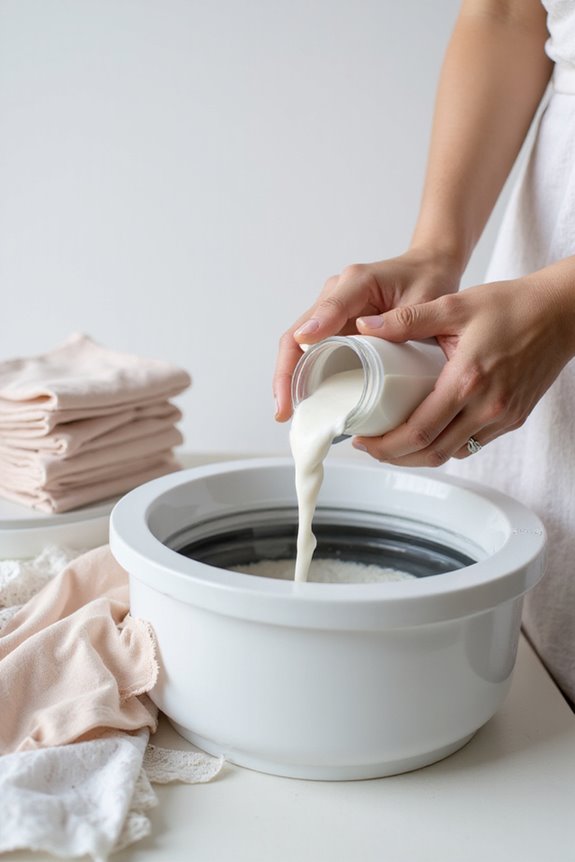
When we’re getting our delicates ready for washing, a little preparation goes a long way in keeping them looking their best. First, let’s do a quick garment inspection. Check for stains, and if we find any, apply gentle pre-wash treatments with natural stain removers. Next, we should turn our delicates inside out and secure closures like zippers—trust me, it saves them from snags!
When washing, remember to avoid wringing or twisting them. Instead, gently press out excess water with towels. After rinsing, confirm all detergent is gone, as residue can harm delicate fibers. By following these simple steps, we can help our favorite pieces stay fabulous for longer! Additionally, using a gentle wash detergent specifically formulated for delicate fabrics can further enhance their longevity and appearance.
Importance of Sorting Laundry
Taking care of our delicates doesn’t just stop at preparation; sorting laundry is another big step in keeping our favorite pieces looking their best. By organizing our laundry, we protect delicate fabrics like silk and wool from harsh agitation that could tear or stretch them. We should always separate heavier items with buttons or sequins to avoid snagging lighter fabrics.
Sorting by color is also essential. It prevents dye transfer and keeps our whites bright. Plus, sorting by how dirty items are helps us choose the right wash cycle, ensuring cleaner clothes without damaging the delicate ones. So, let’s embrace laundry organization for better fabric protection and longer-lasting garments. It really does make a difference!
Spin Speeds for Delicate Fabrics
While we all want our delicates to look their best, understanding spin speeds can make a world of difference in how they hold up after multiple washes. For delicate fabric care, we should stick to low spin speed variations, ideally between 400 and 600 RPM. This gentle approach reduces mechanical stress, helping to prevent distortion and damage to sensitive materials like silk and lace. Higher speeds might seem tempting, but they can lead to wear and wrinkling. Many modern machines have dedicated “delicate” cycles that automatically select these lower speeds. So, let’s take a moment to double-check those care labels and opt for gentler spins. Our delicate pieces will thank us, and we’ll keep them looking fabulous longer!
Cycle Duration and Its Impact
Understanding the duration of wash cycles is essential for keeping our delicates in top shape. Typically, delicate cycles last between 45 minutes to 1 hour and 20 minutes. Shorter durations are our best friends, as they prevent excessive wear on sensitive fabrics like silk and lace. This means we can enjoy fabric longevity while maintaining cycle efficiency. If we’re washing lightly soiled items, opting for a shorter cycle can save time and protect our favorite pieces. However, longer cycles might be tempting for a deeper clean, but they can risk damaging our delicates. So, let’s remember: shorter is often sweeter when it comes to keeping our delicate treasures looking their best!
Washer Features to Protect Delicates
Now that we’ve covered how cycle duration affects our delicates, let’s explore the features of washers that help protect these sensitive fabrics. Many modern washer innovations include specialized delicate cycles that reduce agitation and limit spin speeds. This means our silks and lace can stay intact without the fear of damage.
Steam technology cleans gently, while innovative drum patterns minimize snagging. Plus, some washers have dose automation, ensuring just the right amount of detergent for maximum fabric protection. Using a gentle detergent can further enhance the care we provide to our delicate items.
Front-load models typically provide better care for delicates due to their gentler tumbling action. Customizable settings let us adjust water temperature and spin speed, giving us the control we need to keep our favorite items looking their best.
Tips for Maintaining Delicate Garments
Taking care of our delicate garments can feel like an intimidating task, but it doesn’t have to be! First, we should limit cleaning frequency for natural fibers like silk and cashmere to maintain their strength. When we wash, let’s stick to cold or lukewarm water and use a mild detergent specifically made for delicates, like Woolite.
For garment storage, remember to keep them in breathable fabric bags, avoiding plastic to prevent moisture buildup. We can also add natural moth repellents like cedar to protect our treasures! Finally, let’s gently reshape them while air drying. By following these tips, our delicate garments will stay beautiful and last longer. Who knew caring for them could be this easy? Additionally, using hypoallergenic formulations for fabric softeners can further protect the integrity of delicate fabrics.
Frequently Asked Questions
Can I Wash Delicates With Regular Laundry?
We can wash delicates with regular laundry, but it’s risky. To protect delicate fabrics, we should use laundry tips like mesh bags, gentle detergents, and cold water to minimize damage and preserve their quality.
How Often Should I Wash Delicate Items?
We’ve learned that caring for delicate fabrics is like tending a fragile garden. Washing frequency is key; while underwear needs daily care, other delicates can often go longer between washes, preserving their beauty and integrity.
Is Air Drying Better for Delicates?
When it comes to caring for delicates, we believe air drying’s benefits, like preserving moisture retention and preventing damage, outweigh the convenience of machine drying. It’s gentle and keeps our favorite fabrics looking their best.
Can I Use Fabric Softener on Delicates?
We’ve often wondered about using fabric softener on delicates, but it’s best to avoid it. Instead, let’s explore fabric softener alternatives that guarantee proper delicate fabric care without risking damage or residue buildup.
What to Do if Delicates Shrink in the Wash?
If our delicate fabrics shrink in the wash, we can try soaking them in lukewarm water with conditioner. This method aids shrink prevention and helps us gently stretch the fibers back to their original size.

